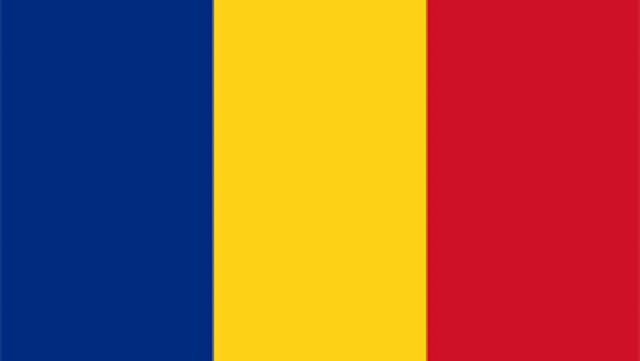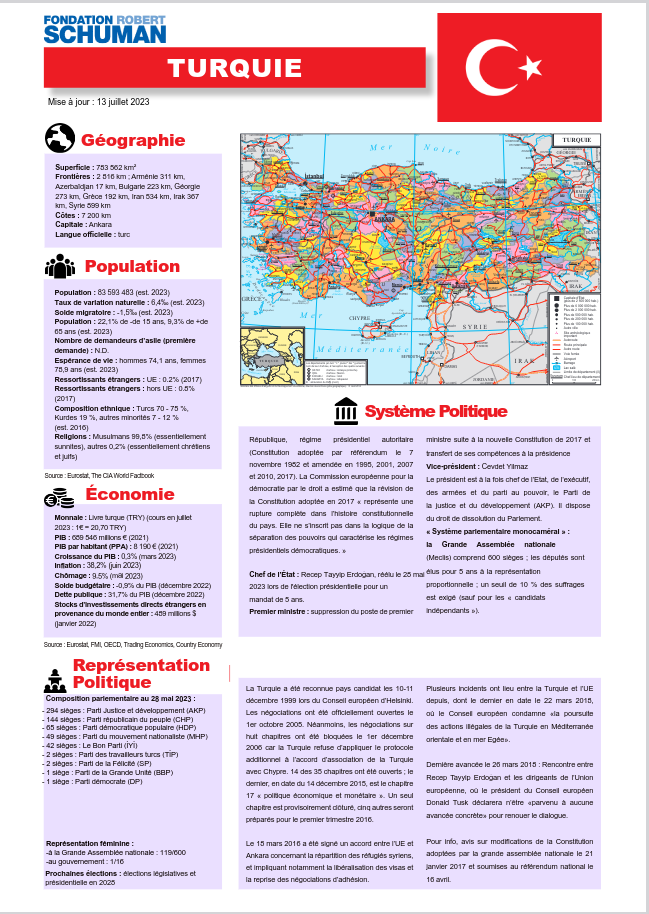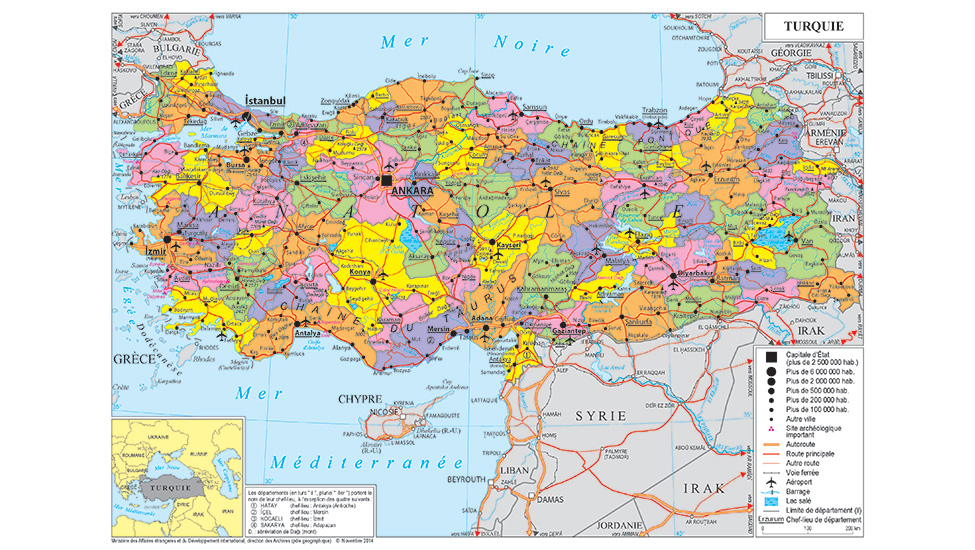
Geography
Area : 783,562 km²
Borders : 2,816 km (Armenia 311 km, Azerbaijan 17 km, Bulgaria 223 km, Georgia 273 km, Greece 192 km, Iran 534 km, Iraq 367 km, Syria 899 km)
Coastline : 7,200 km
Capital : Ankara
Official language : Turkish
Flag
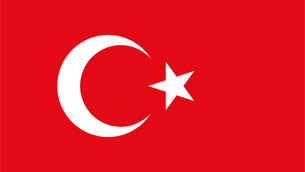
Population
Population : 84,119,531 (2024 est.)
Crude natural change rate : 6.1‰ (2024 est.)
Population repartition: 21.7% under 15 years old, 9.6% over 65 years old (2024 est.)
Foreign residents: EU nationals 0.2%, non- EU nationals 0.8% (2017)
Crude net migration rate: -1.5‰ (2024 est.)
First time asylum applicants: 19,017 (2023)
Life expectancy: men 74.7 years, women 79.2 years (2024 est.)
Religions: Muslim 99.8% (mainly Sunni), other 0.2% (mainly Christian and Jewish)
Ethnic groups: Turks (incl. Alevis) 70 - 75%, Kurds 19%, other minorities 7 - 12% (est. 2016)
Source : Eurostat, The CIA World Factbook
Economy
Currency: Turkish lira (TRY) (exchange rate in June 2025: €1 = TRY 46.65)
GDP: € 1,220,308.3 million (2024
GDP per capita (PPS): € 14,291 (2024)
GDP growth : 3.2% (2024)
Inflation: 35.41% (May 2025)
Public debt: 24.7% of GDP (December 2024)
Unemployment: 8.6% (April 2025)
Stock of foreign direct investment from the entire world: $164.9 billion (2022)
Budget balance: -5.2% of GDP (December 2024)
Source : Eurostat, FMI, OECD, Trading Economics, Country Economy
Political system
Republic, parliamentary democracy, authoritarian presidential regime (Constitution adopted by referendum on November 7, 1982 and amended in 1995, 2001, 2007 and 2010, 2017). The European Commission for Democracy through Law has estimated that the revision of the Constitution made in 2017 «represents a complete break in the constitutional history of the country. It does not fit into the logic of the separation of powers that characterizes democratic presidential regimes.»
Head of State Recep Tayyip Erdoğan, re-elected on 28 May 2023 in the presidential election for a five-year term. The president combines the functions of head of state, head of the executive, commander-in-chief of the armed forces, as well as leader of the Justice and Development Party (AKP), currently in power. He also holds the authority to dissolve Parliament. The AKP government is supported by the MHP, HÜDA PAR, and the DSP.
Prime Minister abolition of the post of Prime Minister following the new Constitution of 2017 and transfer of its powers to the
Vice-president Cevdet Yilmaz
"Monocameral parliamentary system" the Grand National Assembly (Meclis) comprises 600 seats; deputies are elected for 5 years by proportional representation; a threshold of 10% of the vote is required (except for “independent candidates”).
Political representation
Parliamentary composition since 28th May 2023
- 267 AKP seats (Justice and Development Party, Islamo-conservative)
- 128 seats CHP (Republican People's Party, Kemalist)
- 57 seats DEM (Peoples' Equality and Democracy Party, Kurdish)
- 50 seats MHP (Nationalist Action Party)
- 30 seats IYI (The Good Party, center-right)
- 20 seats SP (Saadet, Bliss Party, religious nationalist)
- 15 seats DEVA (Democracy and Progress Party
- 7 independent seats
- 4 seats HÜDA PAR (Free Cause Party, Kurdish Islamist)
- 4 seats YRP (New Prosperity Party, populist)
- 3 seats DP (Democratic Party)
- 3 seats TIP (Workers' Party of Turkey, communist)
- 2 seats DBP (Democratic Party of the Regions)
- 2 seats EMEK (Labor Party, communist)
- 1 seat DSP (Democratic Left Party)
- 7 seats Vacant
Relations with the EU
- Turkey has been a candidate for membership of the European Union since 1987. This status was officially recognized at the Helsinki European Council in December 1999. Accession negotiations began on October 3, 2005, but the steady deterioration in Turkey's situation with regard to democracy, the rule of law and fundamental rights has seen the country move further and further away from the EU.
- Dialogue between Turkey and the European Union has been renewed in recent years. At the European Council of 17th and 18th April 2024, EU leaders reaffirmed their desire to deepen negotiations with Turkey. To this end, they instructed the ambassadors of the Member States to prepare a progress report on the negotiations. The last intergovernmental meeting in the enlargement process was held on June 30, 2016. As part of the negotiations, 16 chapters were opened and only one provisionally closed.
- An association agreement between the EU and Turkey was concluded back in 1963, with the aim of strengthening economic cooperation and bilateral trade relations. The EU-Turkey customs union has been in force since 1995.
Women's representations
- in the Grand National Assembly: 117/600
- in government: 1/19 (including the President)
Next Elections:
On The Same Theme
Country Sheet
Country Sheet
Country Sheet
Country Sheet
Country Sheet
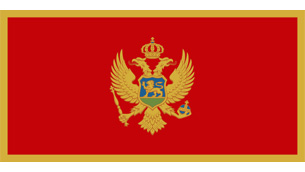
Country Sheet
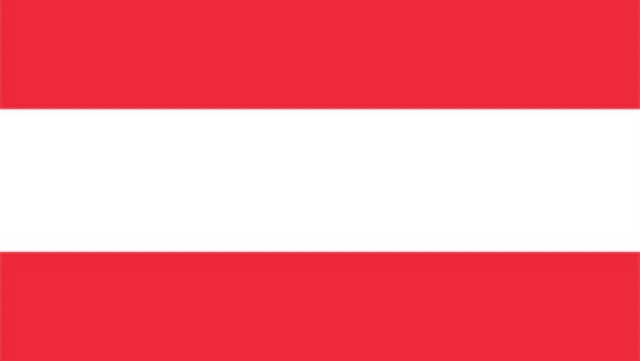
Country Sheet
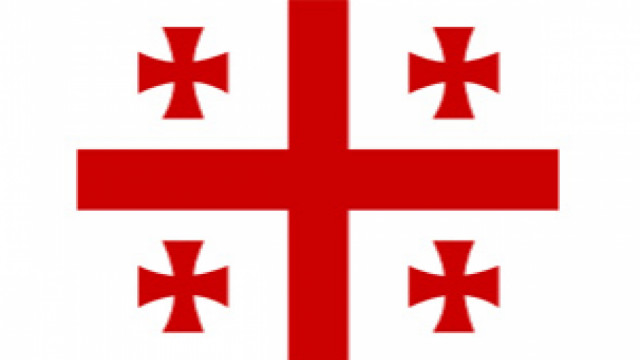
Country Sheet
